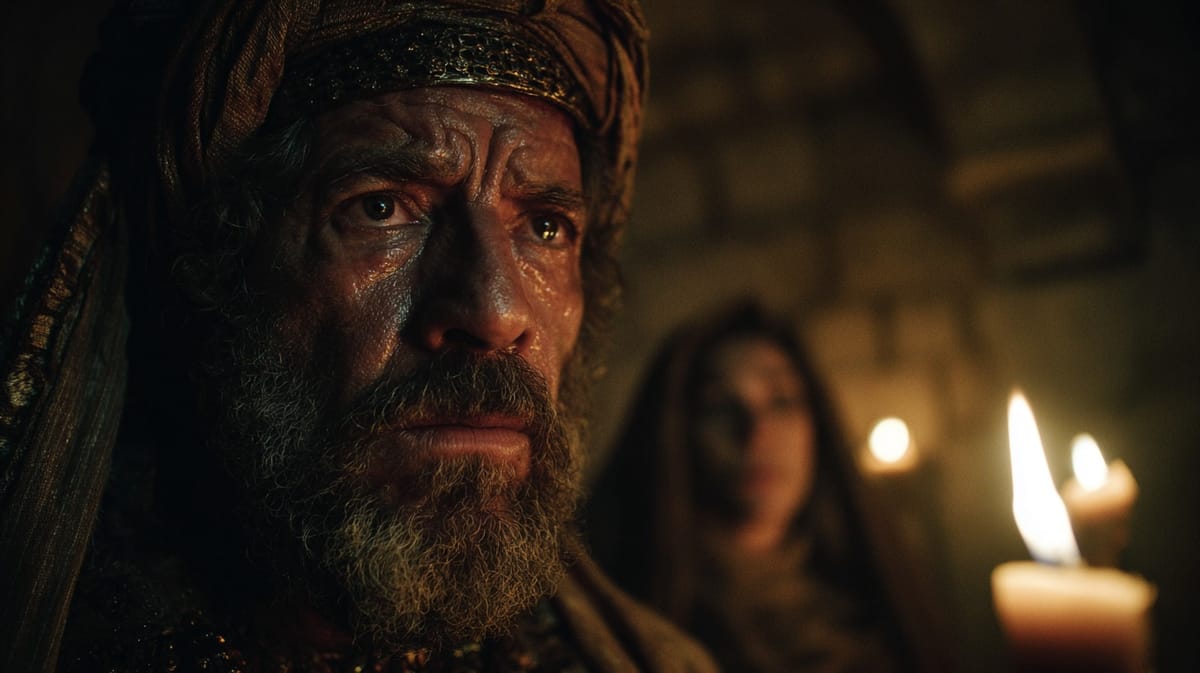Fairhaven Sermon 10-5-2025

Summary
In this week's service, Rev. Peg Bowman launched a new mini-series titled "Spooky Sermons," designed to explore biblical themes related to Halloween. She addressed the common Christian debate surrounding the holiday, clarifying that while some view it as tied to the occult, the series will instead examine biblical stories with spooky elements. Bowman began by exploring the origins of Halloween, tracing it back to All Hallows' Eve and its connection to remembering saints. She then introduced the story of King Saul consulting the Witch of Endor, highlighting his insecurity and desperation as driving forces behind his violation of God’s law.
Bowman emphasized the dangers of attempting to manipulate or force God's will, referencing Saul’s actions as a cautionary tale. She underscored the biblical prohibition against practices like divination and spiritism, arguing that true faith involves trusting God’s guidance rather than seeking answers through forbidden means. The sermon concluded with a reflection on the consequences of Saul’s actions and a reminder that God remains in control, urging listeners to trust in His plan rather than seeking shortcuts through occult practices.
Transcript
Okay, so this Sunday we are starting another mini-series. This one is designed with October and Halloween in mind. And I'm calling this, I think we're calling this the Spooky Sermons series. This is a series of sermons on witches and spirits and other things like that that are found in the Bible.
And I wanted to start out by talking about Halloween itself just for a moment, because there are some Christian churches and some Christian backgrounds more conservative than ours that believe that Halloween has no place in the church, that Halloween is tied to the occult, and that Scripture is clear that occult practices are forbidden. There are indeed a number of passages in Scripture that, both the Old and New Testament that talk about the occult. I'll share just two of them. Deuteronomy 18, 10 to 12 says, 'Let no one be found among you 'who practices divination or sorcery, 'interprets omens, engages in witchcraft, 'casts spells, or is a medium or a spiritist, 'or who consults the dead.
'Anyone who does these things is detestable to the Lord.' And the Apostle Paul writes in this message we just heard today, The works of the flesh are fornication, impurity, licentiousness, and he says, idolatry and sorcery amongst those other sins. God does not mince words about this. So how did it happen that our supposedly Christian culture came up with Halloween? Well, Halloween comes from All Hallows' Eve, which was and is the day before All Saints' Day, which is November 1st, which used to be a major holiday in the church, not so big now as it used to be.
All Saints' Day was a day to remember the saints who've gone before us. And we still do this every year in our churches. We remember our loved ones who have passed in the previous year. So All Hallows' Eve was also just sort of in the popular culture, sort of a boundary between summer and winter, between growing and harvesting.
And all of these events just sort of came conflated into a folk holiday that involves eating sweets and dressing up in costumes. And that's Halloween. Yeah. There are a few stories in the Bible that seem a little bit spooky and Halloween-like, and that's what we're preaching on this month.
Probably the best known of these stories is the one we just heard, which is the Witch of Endor or the Medium of Endor. And before we dig into the story, I wanted to ask this question. How many of us have ever wished that we could speak to someone who has passed? Yes. I mean, I know I would love to talk to my dad again.
And I would love to talk with my good friend, Melinda, again. She passed away from cancer at the age of 40, which is way too young. And I miss her still. If it's really possible to speak to the dead, and if a medium could make it happen, then why don't we do it? Well, the number one reason is because God says, No, don't do that.
But of course, children, even children of God, are famous for asking the question, Why? Why would it be wrong to bring somebody back from the dead? And coming at that question, setting scripture aside just for a moment, coming at this just through pure reason, I can come up with a few reasons why bringing a dead person back to life would not be a good idea. If we really care about the person who has passed, knowing that they have passed through death into God's kingdom beyond, if we bring them back to this side of death's door, are they going to have to die a second time? If it was someone I loved, I wouldn't even risk that. Dying once is more than enough for most of us to deal with. And I would never ever chance somebody having to die a second time.
Another reason not to do this is because the world has changed since that person died. And the longer they've been dead, the more shocking that change would be. Think for a minute, just imagine, I sometimes think of weird things like this, but Like, for example, if Ben Franklin could come back and see where we are today, right? How would he react to what we've done with his discovery of electricity? What would he think of an electric car? What would he think of a car? Would he be terrified by what he saw? Right. I think he'd be partially intrigued too, but I think he'd also be looking around going, oh my goodness.
He's never seen anything that moves faster than a horse. Right? So what about airplanes? If we really care about the person who has passed, we would never do this to them. But in our scripture reading for today, bringing the dead back is exactly what happened. God's law was violated and God's prophet Samuel, who was passed, was violated.
So what was King Saul thinking? I mean, he was a man that God chose out of all of Israel to be the king, to lead his people. Why was he consulting a medium? Let's take a look at what happened in that scripture we just heard. The word tells us that Saul was a man unsure of himself. He was always sort of debating and divided on the inside.
And because of this, he didn't always listen to God's word from Samuel the prophet. Saul was basically just sort of an insecure person. And that insecurity got worse after David killed Goliath and became sort of a popular hero in their nation. We also need to know that sometime during Saul's early years as king, when he was still committed to doing things God's way, that Saul had made a law in Israel, in keeping with God's word, that all mediums and wizards and workers of magic were to be put out of the country, banished completely.
that years later, as we come to our reading for today, the prophet Samuel has just died, Samuel being Saul's main advisor, the person he leaned on the most, and the Philistines decided it would be a good time to attack Israel again. And David wasn't there to lead the army this time because Saul had chased him out of the country. And now Samuel, he's gone. Saul's on his own.
And when Saul sees these Philistine armies, he's afraid. So he prays for guidance. And here's nothing. He consults with the priests and says, and he gets nothing.
He tries the Urim and Thummim, and there's something that prophets sometimes use to hear from God. But heaven is silent. There is no word from God to be found. Saul is on his own, and he is beside himself with fear.
So what's he going to do? Now Saul has never had the confidence in God that David has. You remember how his spirit about going into battle for the Lord, you know, he's into that. Saul could never get that kind of confidence. David knew and loved God so well that when he fought, he fought for God's honor.
and God honored this and gave David victory. But back in the days of Goliath, Saul had stayed in his tent, too scared to go out and lead the army. And now, being desperate for some word from God, some direction, some assurance, some guidance on what to do, Saul can't find any. So out of fear and desperation, Saul tells his men, Go find a medium, even though he knows that that's illegal.
Saul is breaking the law that he himself wrote. So Saul's men obey his command and they find a medium and Saul dresses up in a disguise, partly so that the public won't know where he's going and partly to fool the medium. But there's an irony here. If this person really is a real medium, she'll be able to see through the skies.
And if she isn't, Saul's in trouble anyway, either way, no matter which way things go. So let's step into the action that we heard a moment ago. Saul asks this medium to call up a spirit for him. She answers that this is illegal, but Saul swears by God's name, God who said not to do this, right, by God's name, that no punishment will come on her.
And she says, okay, who do you want to talk to? And Saul names the prophet Samuel. So the medium calls up Samuel. She was no fake. She knew what she was doing.
And the minute she saw Samuel, she also recognized Saul. And she cried out in fear and Saul said to her, Don't be afraid, tell me what you see. Saul's asking this woman to have more courage than he has. And she tells him she sees a divine being coming up out of the ground, and Saul says, What does he look like? And she says, An old man wrapped up in a robe.
And Saul bows down with his face to the ground like a subject, not like a king. Saul has completely forgotten who he is. And then Samuel spoke and he says, Why have you disturbed me by bringing me up? So that's what I'm thinking. People would not want to come back, would they, once they pass through? Anyway, it is not pleasant to do that.
Saul has forced his will on Samuel. Saul has given one of God's greatest prophets, no choice in the matter, no control over his own life. Saul has interrupted Samuel's enjoyment of God's company. thinking only of himself, not about his men, not about this medium, and not about God's people, who he's supposed to be leading.
If Saul had any empathy for Samuel at all, he would have immediately said, I'm so wrong, I'm so sorry. I should never have done this to you, go back. But Saul's aware only of himself. He says, I'm distressed.
The Philistines are coming. God won't answer me. The prophets have no word for me. My dreams tell me nothing.
Tell me what to do. Samuel's answer is a good one. He says, If God won't answer you, why ask me? Good question. We human beings, we mere mortals, we cannot force God's hand.
And that's what occult practices try to do. They try to force God's hand. They try to skirt around God's law. They tempt us to play God.
Samuel continues. He says, God has done to you just what he said through me he would do. God has torn the kingdom out of your hand and given it to your neighbor David because you didn't obey the command of the Lord concerning King Amalek, which is another story for another day. But Samuel speaking true when he says this, As Samuel adds, God will give you and Israel and Israel's army into the hands of the Philistines, and tomorrow you and your sons will be with me.
That is, in the land of the dead. Saul almost passes out from fear. This is like way too much for him to deal with. And then Samuel disappears and the medium comes to Saul and says, Look, I've listened to you.
Now you listen to me. You're weak right now, eat something. You can't get home right now. And it was true, Saul hadn't eaten anything for over a day.
And his servants agreed, they persuaded him to eat. The medium sacrificed her fatted calf for him. That's the most important meal that a person could make. And she made fresh bread and she served the men and they ate and they went home.
And our scripture reading for today doesn't tell us this, but the very next day, Samuel's words come true. Saul and his sons, including Jonathan, David's best friend, die in battle with the Philistines. And 2 Samuel 1 contains a song that David wrote to remember them. He says, How the mighty have fallen! Tell it not in Gath, proclaim it not in the streets of Ashkelon.
Saul and Jonathan, in life they were loved and admired, and in death they were not parted. How the mighty have fallen! The weapons of war have perished! This whole poem, David's Lament, is worth reading if you have a moment. It's the first chapter of 2 Samuel. David loved both Saul and Jonathan dearly.
And David will remember and honor the family of Saul when he becomes king. But that's another story for another day. For today, we have this unusual story of a medium, a real medium, doing what mediums do, which is forbidden by God's law, doing it at the command of a man who knew better and was disregarding God's law. And it leaves us to wonder what might have happened if Saul had chosen a different course of action.
If there's anything this passage teaches us, is that we should never try to take control from God. God is in charge, thank God. And if God won't answer, whatever it is that we're asking about, leave the thing alone. Don't try to force the issue.
The Bible specifically and clearly says no to divination, witchcraft, wizardry, sorcery, omens, spells, spiritists, calling up the dead, enchantments, and there are no exceptions. we as God's people, we listen to God and we do what God commands because we love God and because God is God and we are not. Thanks be to God. Amen.
Amen.



